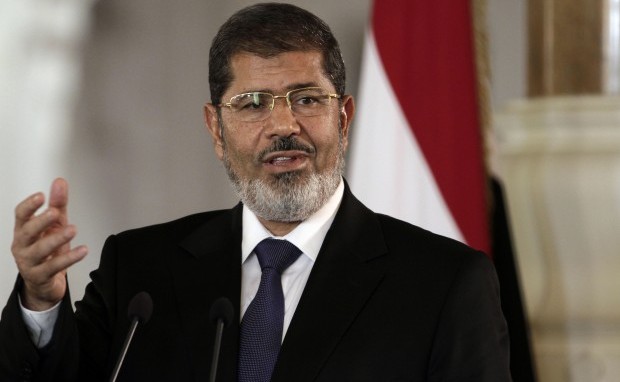
In this July 13, 2012 file photo, Egyptian president Mohamed Mursi speaks to reporters at the Presidential Palace in Cairo. (AP Photo/Maya Alleruzzo, File)
Mursi supporters have launched a Tajarud (Impartial) petition following calls by Al-Gama’a Al-Islamiyya leader Assem Abdul-Majid. This battle of the petitions comes in the week that an independent public opinion research center revealed that just 100 days into the job, his popularity had decreased to 30%.
The Tamarod campaign is seeking to “forment rebellion against the Muslim Brotherhood” and withdraw confidence from President Mursi, claiming that he has failed the revolution that brought him to power. This campaign is seeking to collect 15 million signatures in support of a vote of no confidence in Mursi; this would outnumber the 13.2 million votes he received to become president last year.
The Tamarod petition is gaining more and more signatures every day, and a number of prominent intellectuals and writers signed it on Monday.
George Isaac, a member of the Egyptian opposition National Salvation Front (NSF), told Asharq Al-Awsat that the Tamarod campaign represented the return of the Egyptian Movement for Change, which was the first group to oppose the Mubarak regime and which had been one of the major catalysts for the January 25 revolution.
Isaac, who served as the first general coordinator of the Kefaya movement, emphasized: “I believe that the Tamarod campaign is the beginning of the second wave of the Egyptian revolution, and this will lead to the achievement of the objectives of the revolution that we failed to achieve until now.”
“If President Mohamed Mursi wants to protect the country from division and disintegration, he must call for early presidential elections in response to the demands of the majority of the Egyptian people,” he added.
Isaac noted that President Mursi was elected president on the back of a controversial constitutional declaration issued by the then-ruling Supreme Council of the Armed Forces, and after he took office he issued a number of controversial constitutional declarations himself which removed any legitimacy that he had gained by the ballot box.
As for the Tajarud petition launched by Egypt’s Al-Gama’a Al-Islamiyya’s Assem Abdul-Majid emphasized that his pro-Mursi campaign will collect more signatures than the Tamarod petition.
For his part, former presidential contender Hazem Salah Abu Ismail expressed his rejection of petitions being used in this manner to express political positions.
He said, “The Tamarod petition gathering signatures will only serve to divide the country, and there is no legal basis for this campaign,” adding, “I could gather many more [signatures].”
The Egyptian Center for Public Opinion Research (Baseera) conducted a telephone poll on April 29 and 30, 2013 that showed that just 30% of respondents would vote for President Mursi in an election, compared with 37% percent one month earlier and 58% one hundred days after the president’s election.
The poll also revealed that the number of people who “agree” with Mursi decreased to 46%, from 47% one month earlier and 78% one hundred days after the president’s election.

Trackbacks/Pingbacks